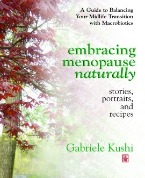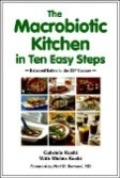Embracing Menopause Naturally: The Myths Versus the Facts
For further information on Menopause,
please check out Gabriele Kushi's book
Menopause is the time when a woman passes from her childbearing years. It concerns the time in a woman's life when some important experiences that have defined her life cease to be. Menopause is a transformational process, a letting go of the old self with a rebirth of a new self. The passage is a different experience for each woman, but it is a journey every woman must make.
Awareness is the best preparation for what life has to offer. Becoming educated about menopause is important for women of all ages. Exploring options of how to handle symptoms is best started early, to find appropriate choices.
One talks about a passage, because to arrive at the state of menopause, the body needs time to prepare and adjust. The natural process of hormonal adjustment can last from two to fifteen years. The "change" as menopause is popular called, can start as early as 35 years and as late as 58 years. The symptoms a woman can experience during this change depend on her overall physical, mental, spiritual, and emotional condition, as well as the society she lives in. Menopause can also be brought on through surgical removal of the ovaries, chemotherapy, radiation, tubal ligation, mumps, an autoimmune reaction, extreme stress, and weight loss.
For generations, the menopausal passage has not been addressed correctly. Myth, fear, and misconceptions painted a negative picture of menopause. As a result, many women are afraid of it. Sigmund Freud, for instance, described menopausal women as "quarrelsome, peevish, and argumentative, petty and miserly . . ." Psychiatrist Dr. David Reuben declared that after menopause, a woman becomes "not really a man but no longer a functional woman" in his best-selling book, "Everything You Always Wanted to Know About Sex, But Were Afraid to Ask."
In a time when Hormone Replacement Therapy is still prescribed although its devastating risks are known, and plastic surgery supports a youth and sex-obsessed society, middle age does not even seem to exist.
Can a woman's status in her society influence the way she experiences her change of life, her menopause? A study by Ann Rite revealed that there is a difference in how traditional and non-traditional Navajo women experience their menopause. The traditional women had fewer symptoms of menopause. The reason seems to be that traditional Navajo people know that the changes in nature are connected with the changing cycles of women. The !Kung women, from the traditional tribe living in Africa, do not even have a word for hot flash, suggesting that these symptoms are not experienced, or are experienced as a natural and accepted part of change.
It is also a well-known fact that the frequencies of symptoms of menopause are lower in Asia than in the West. The reasons for this seem to be the low-fat and high-fiber Asian diet, and the consumption of traditional soy products such as miso and tofu from an early age. Supportive studies have shown that just one serving of soy each day (a half cup of tofu) reduces hot flashes by 10 to 20 percent. These dietary patterns are uncommon in Western societies, but well practiced in the macrobiotic communities.
We all know that the food we eat and the lifestyle we choose affects our well being. Scientific researchers have demonstrated this to us for decades and our own macrobiotic experiences tell us so. The macrobiotic philosophy supports a way of life that follows the rhythm of the seasons and the movement of nature's healing forces. Macrobiotic teaches us how to use food and lifestyles that support and realign natural energies to encourage overall well being. This understanding can help women ease their natural cycles with foods that are inherently rich in phytoestrogens, calcium, vitamins, minerals, complex carbohydrates, and proteins.
To relieve menopausal stress and symptoms, complementary therapies such as homeopathy, aromatherapy, herbal medicine, Do-IN massage, shiatsu, and acupuncture are excellent methods that support a natural food lifestyle and help one to feel one's best. By eating balanced meals, eliminating hot flash triggers, doing regular moderate exercises like Yoga, and consciously engaging in daily deep breathing and relaxation techniques, women can experience menopause naturally.
Surprised by my first hot flash, the need to connect to the earth mother's forgotten ancient symbols of menopausal women emerged, and ceremonies needed to be done. Although it seemed too early, at forty-three, my menopausal passage had begun and lasted for five years.
I understood the significance of food and its healing abilities in many physical imbalances. Naturally, I increased the amount of fermented soy foods and other plant hormonal regulators, like kale and daikon radish, when symptoms got too strong. I tried to eliminate the extreme yin and yang foods and conditions that triggered my hot flashes.
My own menopausal passage sparked the interest in developing new recipes and interviewing and photographing midlife women. I wanted to share the life experiences of other menopausal women and provide information for this important time in a woman's life.
Fortunately I had been able to talk with my mother-in-law Aveline Kushi about her menopause. We wondered about other macrobiotic women's experiences with this passage. Aveline Kushi, who devoted her life to making macrobiotics widely available, compared her menopause experience to a hurricane—a tremendous upheaval during the process, followed by a beautiful and peaceful serenity afterward. She encourages whole grains, vegetables, and miso soup, as well as limiting the amount of food one eats while going through menopause.
When I first started asking women what they thought menopause was, some of them did not have clear ideas, whereas others were dealing with the change very effectively. The women I talked to who had not yet entered the journey, and had not educated themselves about menopause, had mostly negative associations with it. Some identified it with old age, which dries one up from the inside out, like an old prune. They thought it meant being over the hill, not being attractive anymore.
I chose women from a diversity of cultures to explore universal approaches to menopause. Many of the women who contributed their menopausal passage stories were women I was introduced to in the context of this project. Others are friends, macrobiotic teachers, and long-time acquaintances of mine. I designed a set of questions, the women had the freedom to answer or not, and this ethnographic study evolved over several years.
The variety of experiences in the stories of the women's menopausal passages illustrates what could be expected while going through menopause. The women's stories create a supportive community for the reader—whether she is a woman who is encountering menopause, a woman interested in what menopause entails, or a man searching for insight about a woman he cares for.
Most of the 21 women I interviewed for my book did not have experiences that live up to the myth and the negative characterizations. Only some women expressed regret about the physical changes, few lamented the end of menstruation and many felt relieved about not having to worry about contraception, menstruation and pregnancy. The most common symptoms the women experienced were hot flashes, irregular sleep and mood swings.
To alleviate the stress, some women turned to their traditional cultural rituals for affirmation of this phase of life, while others sought alternative medicine. In several stories in the book, the women recount the experience of menopause while following a macrobiotic way of life.
Some of them lived a natural lifestyle for decades, while others changed their way of life while going through menopause. Here are excerpts form five macrobiotic women on how they experienced their menopausal passage.
Shizuko Yamamoto, who brought the Japanese way of massage to the West through her book Barefoot Shiatsu, says: "For forty years I have been following a natural macrobiotic lifestyle. I observed that changes occurred slowly over a period of time because macrobiotics embraces a natural healing process. It follows nature's movement, and we are part of that process. According to Oriental medicine, the spleen and pancreas are very important for overall health. They are located in the center of the body and are involved in the immune, hormonal, and psychological functions of the body. When these organs function well, mood swings and hot flashes should not be experienced during menopause."
Dorothy Golden says: "As I was eating a macrobiotic diet for three-and-a-half years, I used more soy products and hoped it would help with my menopausal symptoms. It did help. Although I had been frightened to stop taking hormones, to my surprise the bleeding ceased, and the hot flashes and my other symptoms stopped. The change to eating wisely and going through my passage with natural adjustments helped me to sleep through the night. Other symptoms, like the swelling in my feet and the mucous in my chest, also went away."
Hannah R. Weinberg describes: "When my menopausal symptoms started, it was difficult to consider natural menopause. It seems that most doctors, many of my friends, and society in general expect a woman to take hormones. Fortunately, my doctor, who is female and also postmenopausal, respected my wishes. I have adopted a macrobiotic diet and eat foods rich in phytoestrogens, like the soybean products of tofu and miso and avoid animal fats. I exercise three times a week, including weight lifting, aerobics, and yoga. My relationship with my husband is better than ever. A postmenopausal woman does not have to worry about pregnancy, and this has been liberating for us."
Marquita Wepman said: "I have learned that diet and lifestyle, choices over which I have a marked degree of control, influence my experience of life. The macrobiotic teachings of the Five Energy Transformation Theory, which can also be applied to a woman's life cycle, helped me to understand this."
For Diane Avoli diet is everything you take in. "It is not just the physical food that goes into your mouth. It is your home, your family, your job, everything. Disruptions, stress, too many demands, or unhappiness in your work or relationship, can affect how you experience menopause. In addition to creating harmony and balance within your life situation and adjusting your daily food intake, it is also helpful to just accept what's happening. If you can do that, the menopausal passage can be smooth and positive."
For men and women alike, the meaning of midlife and the view on menopause needs to change. Acceptable and non-judgmental language needs to declare menopause a significant passage into wisdom and old age.
Menopause is not to be dreaded, but accepted as a continuation of a woman's evolution. Menopause offers opportunities for a woman to grow spiritually, live healthfully and become aware of her needs, physically and emotionally.
I encourage women to experience menopause naturally and with awareness. Find out what menopause really means for you, and reconsider covering it up through face-lifts or by using Hormone Replacement Therapy.
When women live a natural - macrobiotic - lifestyle, they can stop worrying, not only during their menopausal passage, that their bodies are going to disintegrate, their hearts are going to dissolve, and their bones are going to break.
When women experience menopause with awareness they are taking the initiation into wisdom and honor themselves. Women need to tell the truth about what they are feeling, and stand up for what they believe.
To bring forth such motion is imperative in women's personal lives, as well as in the political sector. Not only will society's view of women change; women will bring a sense of balance, peace and healing to the planet.
Copyright @ 2024 Gabriele Kushi and http://www.kushiskitchen.com provides educational services only, and does not provide medical nor nutritional advice, diagnosis nor treatments.
Through my affiliate links and book links I might earn a small compensation.
By using this website and my services you agree with the Disclaimer and Privacy Policy.
Click to add text...



